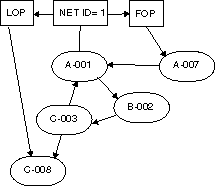"SOME NODES COULD NOT BE CHECKED" loop
A more complex mechanism used to detect a possible loop condition is to assign an earliest start time (EAS) to each operation in the network. An operation can be assigned an earliest start time only after an EAS has been assigned to all its predecessor operations. (First operations are assigned only an Input Arrival date and time.)
- Application A, operation 007, predecessor of A, operation 001
- Application C, operation 008, successor of C, operation 003

In this example, network 1 has one FOP (A-007) and one LOP (C-008), which satisfy the first check operated by the batch daily plan programs. Nevertheless, a loop condition is detected when the batch daily plan programs try to assign an earliest start time to the operations in the network, because the only operation that can be assigned a time is A-007. In this case, message EQQ3150E is issued in the EQQMLOG and EQQLOOP data sets, specifying SOME NODES COULD NOT BE CHECKED as loop type and indicating the total number of unchecked operations, including the operations involved in the loop and their direct or indirect successors. In the system log, the message EQQ3163E indicates a loop condition has occurred. The loop analysis phase that starts immediately after a loop condition is detected, discovers that the loop involves only three operations (A-001, B-002, C-003) and batch daily planning programs list them as loop operations (see messages EQQ3151I, EQQ3152I, EQQ3153I, EQQ3154I, EQQ3155I in the EQQLOOP data set).